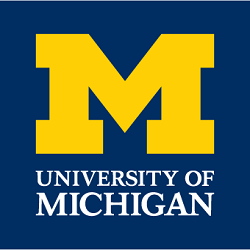About Interdisciplinary Physics (a.b. Or B.s.) (major) in University of Michigan - Ann Arbor
The University of Michigan has one of the country's premier programs for the training of undergraduate and graduate students in physics. The Physics Department has abundant facilities for instruction in physics and offers a wide variety of experimental and theoretical research programs open to undergraduate and graduate students.
Undergraduates concentrating in physics have several degree choices:
- Physics (B.S.)
- Interdisciplinary Physics (A.B. or B.S.)
- Honors Physics Program
- Physics Minor
A total of 60 credits of mathematics and natural science must be elected to receive the Bachelor of Science degree.
Interested undergraduates may also want to look into work in medical physics (a promising path for pre-med students) in the Applied Physics program, or in the Engineering Physics program.
The analytical and quantitative thinking skills you will develop as you work toward any of these degrees will be of great value in many different careers. Most physics majors at U-M follow one (or more) of three paths after graduation:
- graduate work in physics or another field
- employment in industry, software development, or associated field
- professional school in medicine, business, law, or associated area.
The goal of physics is to understand the behavior of matter and energy on every level, from the origins of the universe in the Big Bang to the interior of atoms in your computer screen. In seeking a pure understanding of how the world works, physicists have revolutionized our lives.
Completing an undergraduate degree in physics will give you a rich understanding of how the world works. It will also prepare you either for continued study in graduate or professional school, or for careers in industry, education, medicine, and finance.
Modern science is increasingly interdisciplinary. The Interdisciplinary Physics major allows students the flexibility to supplement their core study of physics with courses in complementary fields. This major can be effective preparation for graduate study in the sciences, for medical, law, and business schools, or for direct entry into the job market.
Because students pursuing the Interdisciplinary Physics degree have a wide variety of career goals, advising from a Physics department advisor is especially important.
It is intended that the flexibility allowed by this program sh
Academic qualification equivalents
- Applicants must have passed high school
English language requirements
University of Michigan Highlights
| Type of University |
Public |
| Degree Courses |
Over 275 |
| International Students |
Around 15% |
| No. of Campuses |
3 |
| English Language Proficiency Test |
MELAB/TOEFL/IELTS |
| Official Website |
www.umich.edu |
| Employment Rate |
Over 95% |
| Location |
Ann Arbor, Michigan, US |
| Average SAT range |
1380-1540 |
| The student to faculty ratio |
15:1 |
| Freshman retention rate |
97% |
University of Michigan Cost of Attendance
The budget table may be useful, but the actual cost is entirely dependent on your lifestyle and the path you choose.
Fall/Winter
| Requirements |
Undergraduate Students |
Graduate Students |
| Tuition and Fees |
52,266 USD |
49,548 USD |
| Housing and Meals |
12,034 USD |
16,502 USD |
| Books and Supplies |
1,048 USD |
1,192 USD |
| Personal Expenses |
2,454 USD |
6,574 USD |
| Total Budget |
67,802 USD |
73,816 USD |
Spring/Summer
| Requirements |
Undergraduate Students |
Graduate Students |
| Tuition and Fees |
25,600.19 USD |
24,266.19 USD |
| Housing and Meals |
5,998 USD |
8,213 USD |
| Books and Supplies |
524 USD |
596 USD |
| Personal Expenses |
1,199 USD |
3,287 USD |
| Total Budget |
33,321.19 USD |
36,362.19 USD |
